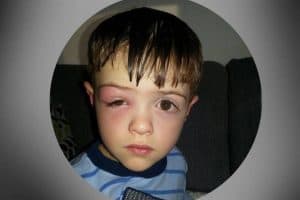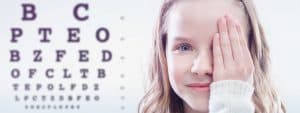This inspirational story highlights the importance of regular eye exams for the early detection of retinoblastoma.
What is Retinoblastoma?
In the United States, up to 300 children receive a diagnosis of retinoblastoma every year, with two-thirds of cases identified before the age of 2.
Retinoblastoma is a rare type of eye cancer that mostly affects children and starts its development in the retina, the part of the eye that detects light, and may occur in one or both eyes.
Unfortunately, retinoblastoma often has few (and subtle) or no symptoms in its early stages, making early diagnosis crucial to successful treatment.
Don’t let retinoblastoma creep up on you – get regular eye exams to ensure early detection and treatment.
A recent case in the UK highlights how a regular eye exam can help detect retinoblastoma and save a child’s life.
Olivia’s Story: How an Eye Exam Saved Her Life
In February 2022, UK optometrist, Dr Laura Leafe received a photo from her sister-in-law, Ewelina Skwarlo. In the photo was her two-year-old niece, Olivia. Ms Skwarlo had noticed an unusual white glow in Olivia’s eye and sent the photo to Dr Leafe, who immediately recognized the signs of retinoblastoma.
Olivia’s life was saved due her mother’s awareness and a routine eye exam.
After conducting an eye exam, Dr Leafe confirmed her suspicions and sent Olivia to Pinderfields Hospital in Wakefield, West Yorkshire, for further examination.
Health professionals at the hospital diagnosed Olivia with retinoblastoma, and she was immediately sent to Birmingham Women’s and Children’s Hospital in West Midlands for urgent treatment, including eye surgery.
What Are the Symptoms of Retinoblastoma?
Retinoblastoma is an uncommon cancer that affects the retina, a light-sensitive tissue at the back of the eye, and can be life-threatening if left untreated.
The symptoms of this eye cancer are few in its early stages, which means early detection can be challenging.
However, there are some signs that parents should look out for:
- A white glow or reflection in the eye, especially in flash photography
- A noticeable difference in the appearance of one or both eyes
- An eye that appears to be looking in a different direction
- Swelling or redness of the eye
- Eye pain or discomfort
- Change in vision
If you notice any of these symptoms in your child’s eyes, immediately take them to an eye doctor for an urgent eye exam.
The Importance of Regular Eye Exams
Regular eye exams are essential for detecting and preventing eye diseases, including retinoblastoma.
During an eye exam, an eye doctor will examine the retina and detect any abnormalities that may indicate the presence of eye cancer.
As an optometrist, Laura Leafe recognized the signs of retinoblastoma and was able to refer her niece for immediate treatment. If Olivia’s parents had not noticed the unusual appearance or contacted their eye doctor, the cancer may have gone undetected until it was too late.
How Is Retinoblastoma Treated?
Retinoblastoma treatment depends on the stage and severity of the cancer. In some cases, surgical removal of the affected eye (enucleation) may be necessary to prevent the cancer from spreading to other vital organs like the brain.
According to the Childhood Eye Cancer Trust (CHECT), only about half of all retinoblastoma cases require the affected eye to be removed as part of treatment. However, early detection can often result in less invasive treatments, such as
- Cryotherapy
- Chemotherapy
- Radiation therapy
- Laser therapy (photocoagulation or thermotherapy).
In Olivia’s case, she underwent four rounds of intra-arterial chemotherapy and five rounds of dual-agent intravitreal chemotherapy. Her tumor has since shrunk and is now under control, although she still requires monthly checkups, cryotherapy, and laser treatments.
Don’t Let Retinoblastoma Creep Up On Your Child
As exemplified by Olivia’s case, a parent’s awareness and regular eye exams are crucial for detecting and preventing retinoblastoma.
Eye doctors are trained to detect and diagnose eye cancer and can refer children to a specialist for further evaluation and treatment if necessary.
It is vitally important to promptly take your child for an eye exam at an eye clinic whenever you notice any abnormalities in their eyes.
Early detection is crucial for successful treatment and improved outcomes.









